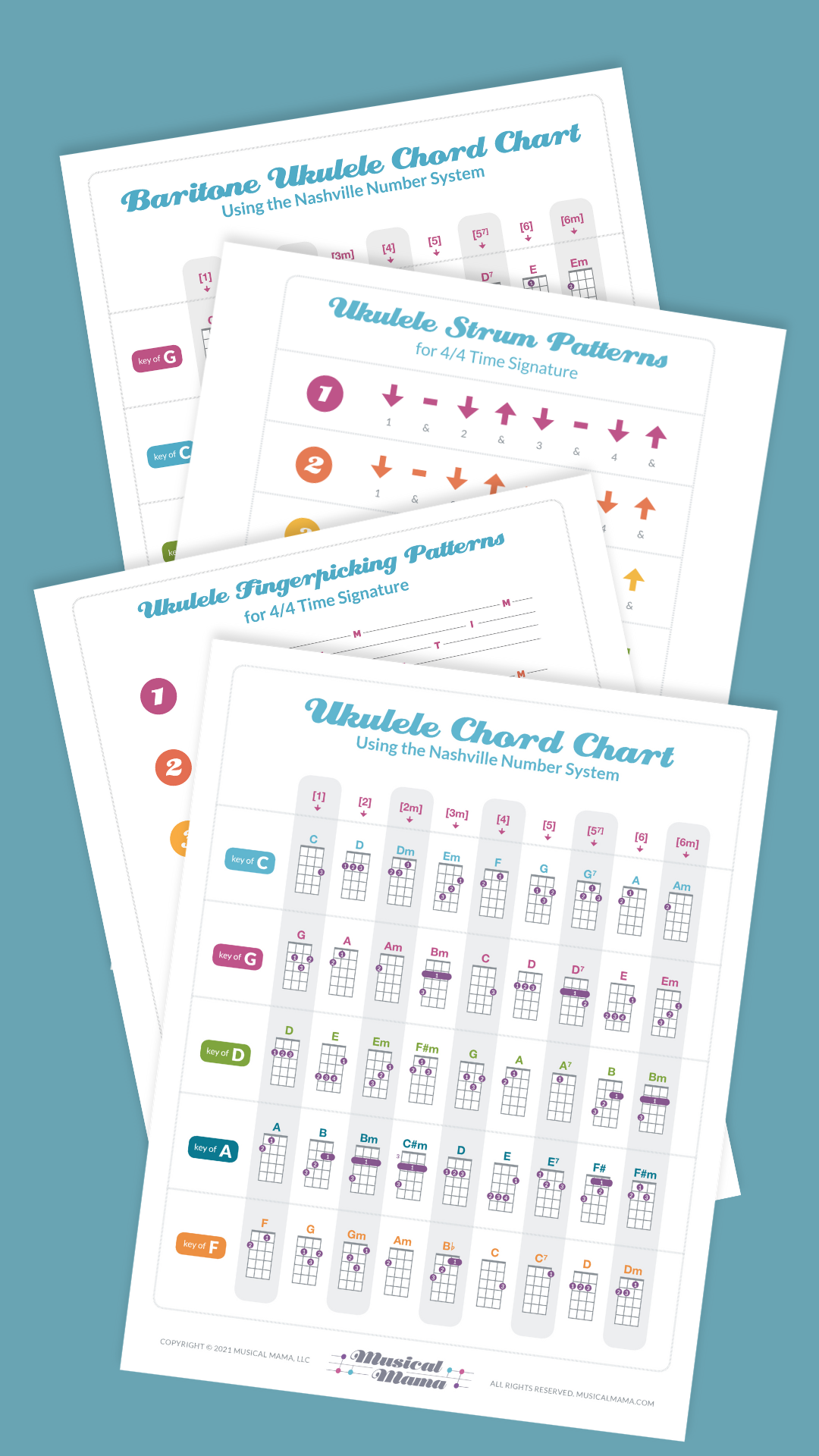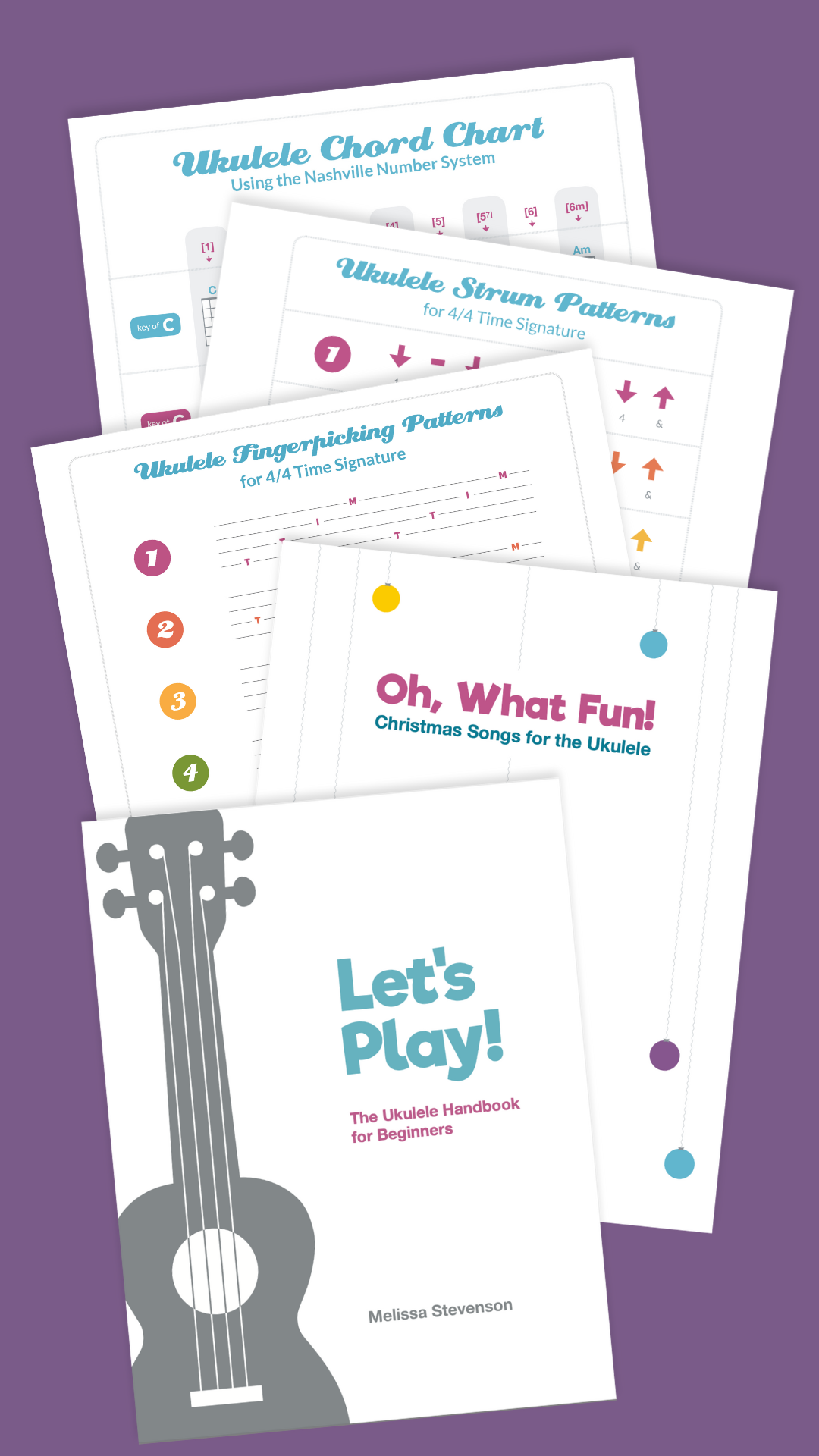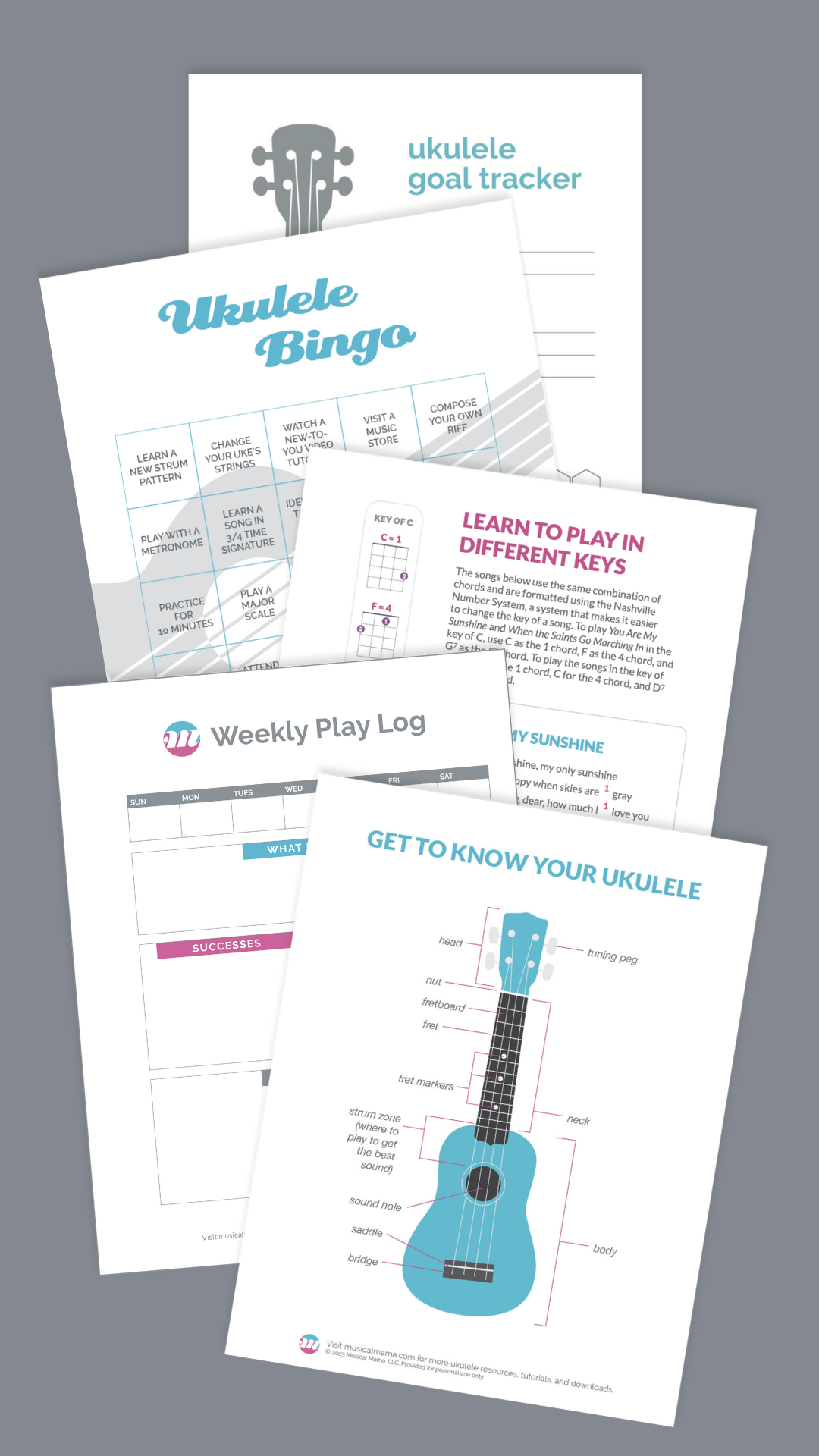I was introduced to The Four Stages of Learning through a podcast (can’t remember which one, though!) a handful of years ago, and it’s a concept that’s really stuck with me. I find myself reflecting on it when I’m teaching and also when I’m thinking about my own development as a musician. If you’ve ever felt impatient by the pace of your progress, I think you’ll find this framework to be really valuable as you continue on your musical path. First I’ll explain the framework and then I’ll share a few tips on how to handle the frustration that inevitably arises when we’re learning something new. Ready?
Read MoreBeginner's Ukulele Lessons — Now Enrolling for Fall!
Sign up for my four-lesson beginner’s course and start making music now! With only four strings, the ukulele is a very friendly instrument for adults with little to no previous musical experience, and many students report feeling a huge sense of accomplishment after the very first lesson! The four-lesson beginner’s course is $280 and includes all instructional materials.
Frequently Asked Questions
What if I don’t have an ukulele?
No problem! Check out my beautiful ukulele starter kits from Ohana!
What is your teaching style like?
I have a very friendly and approachable teaching style. Check out my YouTube channel to see more.
What’s your availability like?
I teach on weekdays, from 9 am - 3 pm.
Have a question about the ukulele course that wasn’t answered here? Check out more FAQs on my Lessons page (scroll down).
Ladies, when can you come back and sing with me? :)
Teaching Ukulele in the Classroom
Earlier this month I got to do something new—I taught a group of parent educators who lead music classes at their kids’ parent-participation school. The music classroom is already stocked with ukuleles, and the parents who lead the K-3 music program wanted to learn how to play the ukulele so they could share the fun with their students.
I led a beginner’s ukulele workshop designed to address their specific needs, covering the basics of how to play chords, how to strum, and shared tips for teaching ukulele in a classroom setting. We had a great time playing through six songs that will be fun for them to share with their students, and they knocked my socks off with their singing! I wish I had a recording to include in this post—they were harmonizing by the second song!
Here’s a review from Rosa, one of the women who attended the workshop:
A few other Moms and I took Melissa's Ukulele Workshop. Our children attend a Parent Participation school and we all teach music and were looking to pick up basics to better understand how to teach the uke. What a lovely experience! Melissa was thorough, concise, kind, and best of all, made learning a new instrument feel easy. We played several songs made up of just a couple of chords and troubleshooted basic hand shapes and positions that made playing chords so much easier. I highly recommend taking any lessons from Melissa, she's incredibly capable and was made to do this!
If you’re looking for an easier way to teach ukulele in a classroom setting, or if you’d just like to take a lesson to see if the uke is for you, contact me and we can plan a workshop just for you!
Read MoreThe Magic of Folk Music
I teach a beginner’s ukulele course in San Jose, CA, and while I do share modern popular music with my students, I primarily teach using well-known folk songs. I occasionally get asked why folk music???? — just like that, with a really big question mark at the end— and it seems that folk music has developed a reputation for being outdated and/or not very fun or interesting. That’s not the case! There’s a lot to love about folk music, and here I’m sharing four reasons why folk music is perfect for beginning musicians:
Read MoreMeet Shawna
I owe a lot to Shawna.
She's my very talented friend who designed the Musical Mama logo, and she was also my very first ukulele student (though I affectionately referred to her as my guinea pig, ha!). Shawna even let me make this video, where she shares her experience of going through the beginner's course:
Having her as my first "test" student helped me refine my teaching style and improve my course materials before I officially launched Musical Mama, and I'll always be grateful for her help. Thank you for everything, Shawna! You're the bomb dot com!
Bringing Your Child to Private Lessons
I know how hard it is to coordinate childcare and find a class that's held at a time that's convenient to your schedule. That’s why, with my beginner’s ukulele course, you have the option of bringing your child to lessons with you!
A Duplo scene created by a three year-old during his mom's private lesson
Children who attend the lessons typically enjoy the novelty of being in a home environment with new-to-them toys. However, if your child has a favorite toy or activity, please consider bringing it to the lesson with you. You’re also welcome to bring a snack for your child.
Babies
Your baby’s needs come first, and we fit the lesson plan around them. Babies love hanging out on a soft blanket and listening to their parent sing and play. If your baby likes to be worn, please bring your carrier to the lessons. The ukulele is very lightweight and small, and it's fairly easy to play while baby-wearing (front or back). You may find your baby enjoys your playing so much that s/he falls asleep during the lesson!
Toddlers
Children this age have pretty short attention spans and may try to join in the fun when they see mommy trying to focus on the lesson! I've seen a wide range of behaviors, and we work around your child's needs— some toddlers prefer to stay right next to their parent during the first lesson while others play nearby with blocks or color with crayons. By your second or third class, your child will likely have adjusted to the structure of the lessons and will be more likely to engage in the age-appropriate activities I have set out prior to your visit.
Preschoolers
Kids in this age range are more likely to partake in activities like coloring, play-doh, or building with blocks or train tracks. Prior to your arrival, I set-up some play stations based on your child's interests. They tend to stay happily engaged in the activities, which makes for a smooth lesson for you!
School-Aged Children
If your school-aged child is attending the lesson with you, I recommend you have them bring along whatever activity (book to read, activity book and markers, etc.) you think will work best.
Special Needs
If your child has special needs, please contact me to discuss arrangements.
What to Bring to the Lessons: My Ukulele and Tuner Recommendations
This post contains affiliate links
So you've signed up for lessons? Yay! This is so exciting! Now let's make sure you have what you need. There are really only two things you'll have to bring to the first lesson: a digital tuner and a ukulele. Here are my recommendations for obtaining those items with only a modest initial investment.
The Tuner
A good digital tuner is as important as your instrument. It won't matter how great your playing is if you're out of tune! My current favorite is the Snark SN5X. You can find it on Amazon Prime for about $10, and it has a big bright interface that makes it easy to tune up your uke. There are other methods for tuning instruments, like phone apps and pitch pipes, but I find the digital tuner to be the easiest, the fastest, and the most accurate way to tune up an instrument.
The Ukulele
If you already have a ukulele:
Great! Make sure it's a soprano, concert, or tenor ukulele. Sopranos are also called "standard" ukuleles, and it's the small, friendly size you typically picture when you think of a ukulele. Concert and tenor ukuleles are bigger and have a slightly different sound, but sopranos, concerts, and tenors all have the same GCEA tuning, which is what we use for the course. The only ukulele that won't work for the Foundations course is the baritone ukulele, which has a different tuning.
If you don't already have a ukulele:
Start with a cheap one. I recommend the Diamond Head and Mahalo brands. Both companies make really happy looking entry-level ukuleles that are available from Amazon Prime for around $30. Choose one in your favorite color or one that matches your decor at home! It doubles as a sculpture, you know. :)
Why I Recommend Starting with a Cheapie:
If you were just learning how to drive, you wouldn't learn on a Ferrari, would you? And it wouldn't make much sense to go car shopping if you didn't know how to drive, would it? How would you even know what to look for, or what features were important to you? If you buy an expensive ukulele, I think you're more likely to look at the instrument as a burden than a source of joy. You may feel guilty for not already knowing how to play it, or feel a responsibility to practice instead of viewing it as a source of fun. You won't feel that pressure if your start-up costs are low.
Learn to play first. Then you can make an educated decision on what kind of ukulele you'd like to buy. And most importantly, once you've upgraded, please pass your starter uke on to your child, so s/he can play with you!
Updated 3/2/17: I've received multiple requests for a recommendation that's a step above the candy colored Diamond Head and Mahalo ukuleles. If you'd prefer to invest a bit more in your instrument, Kala is a brand that makes several ukuleles with good tone and good construction in the $50-150 range. Happy strumming!
The Beginner's Ukulele Course
My beginner's course is a series of four ukulele lessons. In the first lesson, you'll learn three chords, two strum patterns, and three songs! Lessons two, three, and four build on material covered in previous lesson(s), and we cover new information in a very thoughtful way. Basically, I've created the class I wish existed when I was learning how to play!
Here's what you can expect to gain from the course:
The basics: how to tune your uke, how to hold it, how to strum
A variety of strumming patterns
How to fingerpick melodies
An introduction to music theory
How to transpose a song into different keys
Tips on how to incorporate playing into your daily life at home
Course materials to support your playing long after you've completed the course
A songbook consisting of fifteen fun (and easy to play) songs
And bonus: it's all been created for parents and caregivers of young children. I know how precious your time is! We're not going to waste a minute!
Have any questions? Shoot me an email at hello@musicalmama.com. I'd love to hear from you!











